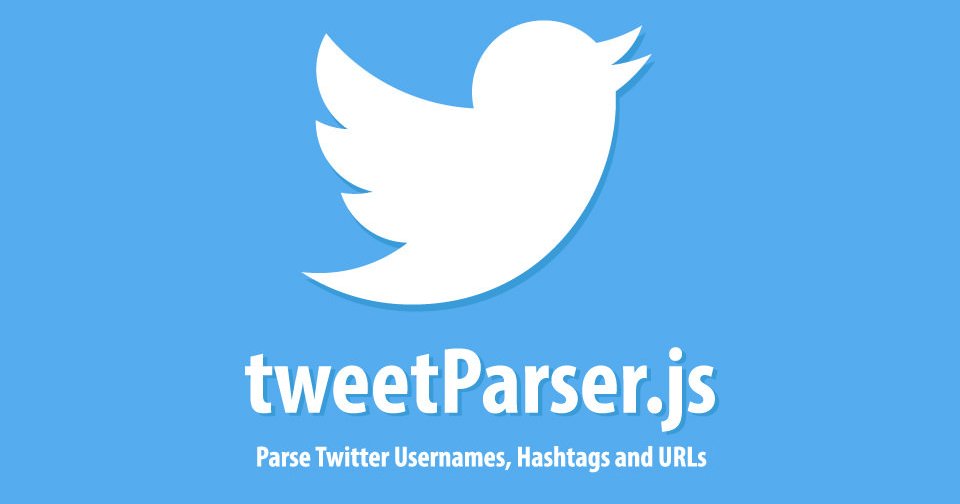tweetparser.js
v3.0.0
Published
A small JavaScript library that parses tweets and turns URLs, @usernames, and #hashtags into clickable links.
Downloads
34
Maintainers
Readme
tweetParser.js - Live Demo

tweetParser.js is a JavaScript library that parses elements containing Twitter-like content, turning URLs, @usernames, and #hashtags into clickable links. This library supports both x.com (formerly twitter.com) links and is flexible enough for other domains.
Key Features
- Automatically converts URLs, @usernames, and #hashtags into clickable links.
- Supports customization with CSS classes for easy styling.
- Compatible with both Vanilla JavaScript and jQuery.
- Option to hide the "@" symbol in @usernames and the protocol (
https://) in URLs.
Installation
Install with npm
npm install --save-dev tweetparser.jsInclude tweetParser.js in your HTML
<script src="path/to/tweetParser.min.js"></script>Parameters
| Parameter | Type | Default | Description |
|---------------------|-----------|-------------------|-----------------------------------------------------------------------------------------------|
| urlClass | String | tweet_link | CSS class used for URLs in the tweet text. |
| userClass | String | tweet_user | CSS class used for @user profile URLs in the tweet. |
| hashtagClass | String | hashtag | CSS class used for hashtag URLs in the tweet. |
| target | String | _blank | HTML target attribute for all generated <a> tags. |
| searchWithHashtags| Boolean | true | If true, hashtags link to x.com/hashtag/; if false, link to x.com/search?q=. |
| parseUsers | Boolean | true | Enables parsing of @user mentions if set to true. |
| parseUrls | Boolean | true | Enables parsing of URLs if set to true. |
| parseHashtags | Boolean | true | Enables parsing of hashtags if set to true. |
| baseURL | String | https://x.com | Base domain for generated links (e.g., https://x.com or https://twitter.com). |
| hideUserSymbol | Boolean | false | If true, hides the "@" symbol in displayed usernames. |
| hideProtocol | Boolean | false | If true, hides "https://" or "http://" in the displayed text for URLs, but keeps it in href.|
Getting Started
Basic Usage with JavaScript
To start using tweetParser.js, apply it to your desired CSS selector. Here’s an example using the .tweet class:
<p class="tweet">This is my awesome tweet! #web #twitter @twitter https://www.twitter.com/</p>// Basic usage
tweetParser('.tweet');
// Usage with custom parameters
tweetParser('.tweet', {
urlClass: "tweet_link", // CSS class for URLs
userClass: "tweet_user", // CSS class for @user profiles
hashtagClass: "hashtag", // CSS class for hashtags
target: "_blank", // Open links in new tab
searchWithHashtags: true, // Hashtags link to hashtag search
parseUsers: true, // Parse @user mentions
parseHashtags: true, // Parse hashtags
parseUrls: true, // Parse URLs
baseURL: "https://x.com", // Base domain for links
hideUserSymbol: true, // Hide "@" symbol in usernames
hideProtocol: true // Hide "https://" in displayed URLs
});jQuery Usage
If jQuery is included, tweetParser.js can be used as a jQuery plugin:
<script src="path/to/jquery.min.js"></script>
<script src="path/to/tweetParser.min.js"></script>$('.tweet').tweetParser({
urlClass: "tweet_link",
userClass: "tweet_user",
hashtagClass: "hashtag",
target: "_blank",
searchWithHashtags: true,
parseUsers: true,
parseHashtags: true,
parseUrls: true,
baseURL: "https://x.com",
hideUserSymbol: true,
hideProtocol: true
});Result Example
You can see the library in action in the live demo.
Contributing
If you’d like to contribute:
- Star the repository on GitHub
- Report issues via the Issues page
- Tweet about it to share with others!
Pull Requests
- Ensure your contribution solves a problem.
- For code quality, use JSLint before submitting.
- Keep your contributions small and focused.
Changelog
v3.0.0
- Added
baseURLparameter: Allows easy switching betweenx.comand soon vintagetwitter.com. - New
hideUserSymboloption: Hides the "@" symbol in usernames if set totrue. - New
hideProtocoloption: Hides "https://" or "http://" in displayed URLs, keeping the full URL inhref. - Remove bower support and uses. (was only used in demo).
Previous Versions
- v2.2.0: Added Babel, ported to ES6 syntax.
- v2.1.3: Fixed target link parameter issue (#10).
- v2.1.2: Emoji support.
- v2.1.1: Wrapped tweetParser and jQuery compatibility into the same file (#9).
- v2.1.0: Introduced jQuery compatibility file for dual VanillaJS and jQuery support.
- v2.0.2: Code refactoring.
- v2.0.1: Firefox compatibility fix for
textContent. - v2.0.0: Removed jQuery dependencies, but maintained jQuery compatibility as an option.
License
tweetParser.js is licensed under the MIT License.
